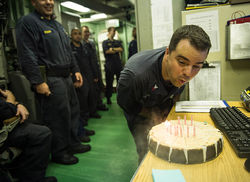Probably probability! (2)
 On March 3rd 2003, I boarded a ship for the first time. I was so excited and started interacting with other people on the ship. The first thing I asked all of them was their birth dates!
On March 3rd 2003, I boarded a ship for the first time. I was so excited and started interacting with other people on the ship. The first thing I asked all of them was their birth dates!
If there were fifty people on the ship, what is the probability of finding two people whose birthday falls on the same date??
Details and Assumptions
-
Assume that no one was born on February 29th.
-
Round off the answer!
-
The answer is in decimals out of 1; not in percentages.
This section requires Javascript.
You are seeing this because something didn't load right. We suggest you, (a) try
refreshing the page, (b) enabling javascript if it is disabled on your browser and,
finally, (c)
loading the
non-javascript version of this page
. We're sorry about the hassle.
2 solutions
http://en.wikipedia.org/wiki/Birthday_problem#Approximations
If we allow for someone to be born on Feb 29th (with uniform probability), how much would your answer change by?
There are 365 days in a year, that's 365 possible birthdays(Leap not included). Therefore for two people the probability is: 1 − 3 6 5 3 6 4 This is because there is one day they could share and 365 days total. Continuing decreasing for 50 people gives: 3 6 5 3 6 4 × 3 6 5 3 6 3 × . . . × 3 6 5 3 1 7 × 3 6 5 3 1 6 = 3 6 5 4 9 × 3 1 5 ! 3 6 4 ! = 0 . 0 3 However, we now need to subtract this answer from one to find the probability that one pair share a birthday. 1 − 0 . 0 3 = 0 . 9 7 Now, there is a generalised formula for this: 3 6 5 n − 1 × ( 3 6 5 − n ) ! 3 6 4 ! Where n = the number of people choosing from! You can see why this is from the example above.
Credit should go to Jaiveer Shekhawat for filling in the gaps for some of my explanation. Thanks!
First, find the probability of all 50 persons having different birth dates!!
Thus, we got to consider only 365 days... the probability will be...
365/365 x 364/365 x 363/365......317/365 x 316/365=0.03
(the first person can be born on any date and any month of the year, the second one can choose only 364 dates out of 365 ....)
thus, the probability of 2 persons having same birth date will be:
1 - 0.03
= 0 . 9 7